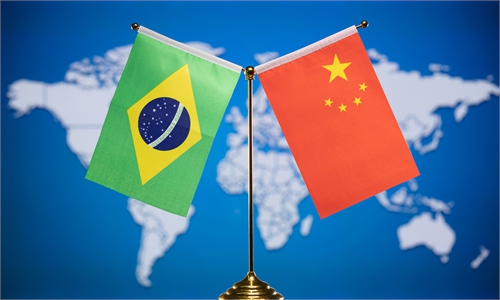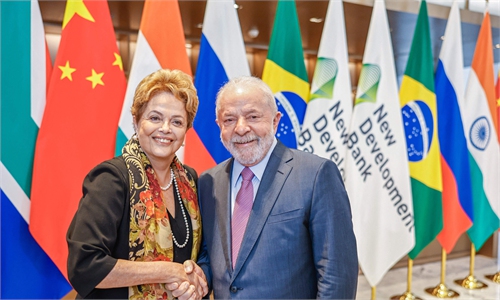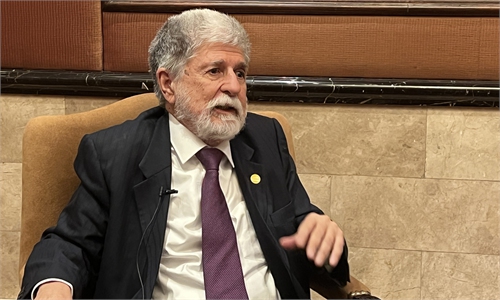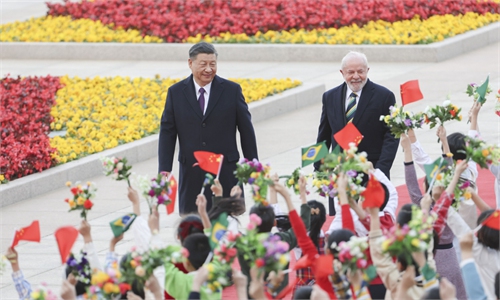IN-DEPTH / DIPLOMATIC CHANNEL
Exclusive with top adviser to Lula: Brazil and China are coming closer together, focus on partnership, multipolar world
Forging ahead
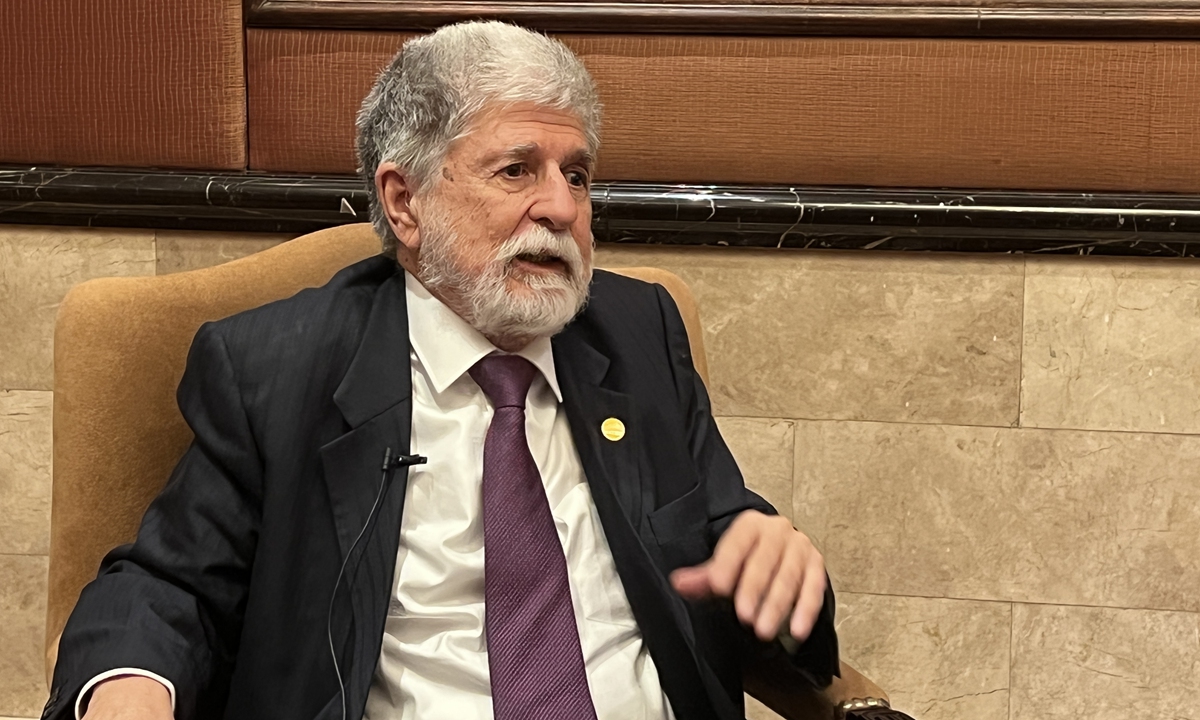
Celso Amorim, a top adviser to Brazilian President Lula Photo: Zhang Yashu/GT
Editor’s Note:
Brazilian President Luiz Inacio Lula da Silva just concluded his four-day state visit to China on Saturday, returning to Brazil with fruitful outcomes. The two sides have inked a number of deals across a range of fields and are ready to work together to steer and create a new future for China-Brazil relations in the new era, and deliver greater benefits to the two peoples. Global Times reporters Xie Wenting and Bai Yunyi (GT) interviewed Celso Amorim (Amorim), a top advisor to President Lula, on China-Brazil relations, cooperation in the semiconductor industry, the Belt and Road Initiative and the Russia-Ukraine conflict among others.
GT: What were the outcomes of President Lula's visit to China?
Amorim: Many outcomes. This is a very important visit, not only because it is the first visit President Lula is making outside our own continent; it's only the third month of [the new] government and he came to China with a big delegation. There was even a meeting of trade unionists, which I think is something totally new in a context like this one.
What I want to stress is that it's not only contact between governments but also between societies. Brazil and China are coming closer together. I think it's very difficult to define one single result, because it's a broader thing. There are results in trade and investment, in environment and cooperation on climate change.
GT: What role will relations with China play in Brazil's foreign policy during President Lula's current term? How would you compare this visit to China with President Lula's previous trip to the US? What was the difference between the two visits?
Amorim: The visit to the US was also an important visit. Both the US and China are very important. But the visit to the US was strictly political. There was not much discussion, maybe a little bit on the environment, but the discussion was not as broad as in this visit here.
It was important because we have to recognize that the US played a positive role by rejecting an attempted coup that happened in Brazil just after President Lula was elected. Of course, the US has still big influence in Brazilian society. The position of President Biden was important from that point of view.
In other matters like international politics, we may have many different views, but this defense of democracy in Brazil was important.
The visit to China is an expansion of our already existing strategic partnership with China. China is our most important trading partner by far. Brazil is becoming one of the places in which China invests more. But not only that, I think the two countries can also have an important role in building a more multipolar world, in which power is less centralized. There is no hegemony. I think this is a very important aspect in which China and Brazil can play important roles.
GT: Is Brazil interested in joining the Belt and Road Initiative? Why?
Amorim: We are interested in seeing how we can do that. It's very important for us to see what are the concrete projects that will come with that. We are open to studying that and seeing how we can do something. For instance, there was a meeting with an important Chinese company, State Grid. We were discussing questions like renewable sources of energy.
As I said in a conversation I had with Wang Yi [director of the Office of the Foreign Affairs Commission of the Communist Party of China (CPC) Central Committee], in reality, we started the Belt and Road Initiative much earlier, because our first cooperation in terms of science and technology was in the satellite area, which was very important. This was in 1986 and by chance myself and the present foreign minister came here as advisers to the minister of science and technology at the time. After that, we had a strategic partnership, so I think the Belt and Road Initiative is already developing in our relations.
GT: In a recent interview, you said that Brazil will seek Chinese technology and investment to develop a semiconductor industry, but it's a relatively sensitive topic in current international politics as the US is pressing its allies to ban Huawei equipment and discouraging association with China in this area. Are you worried that expanding cooperation with China in this area will make the situation more complicated for Brazil diplomatically?
Amorim: I can quote from one of your leaders: We don't care whether the cat is white or black, provided it catches mice. Technology has no ideological tendencies, it's just a means. And we are prepared to work with the US and with China. We will always seek the best offer and the one that is more economically affordable and that can respond to our needs. I don't think it should create any problems, because we are open. So it's not a question of ideology. Trade and investment should be completely free from ideology.
[Cooperating with Huawei] will be a possibility, but it will be studied technically and economically. And that's what we decided. There's no ideological or even geopolitical consideration. Actually, if we can diversify our sources of technology, it would be the best thing for us. So we are very open. We already have cooperation. Huawei is already present in Brazil, and it's already very important.
GT: China and Brazil have struck a deal to trade in their own currencies instead of using the US dollar. Brazil is also thinking of the possibility of creating a common currency for the BRICS and the southern common market. How do you evaluate the feasibility of a common currency for the BRICS? What are the considerations behind these moves?
Amorim: I think it's natural that we can do our own trade in our own currencies and this requires some adaptations in relation to the rules of the IMF. It's only natural because the dollar has become dominant after WWII; before it was the English pound.
So now, if we can work with a basket of currencies and use our own currencies to a large extent, that's the best thing. Whether that can evolve to a common currency for the BRICS, or if we still keep our national currency is something that's not yet totally clear. But I think it's very important that we are free from the dominance of one single currency, because sometimes it is used politically.
For instance, if we want to have a transaction with a country that's under unilateral sanctions which were not approved by the United Nations, sometimes you cannot do that because the transaction, for instance, might be in US dollars. We had problems like that in the past with Iran. We are not selling anything very sensitive. It was things like poultry or meat, but we had problems in having the trade. So that's something we have to look at.
GT: What kind of communication did you have with the Chinese side on the Ukraine issue? In what specific areas can Brazil and China cooperate on the Ukraine issue?
Amorim: I myself had conversations with Wang Yi. I think we have very similar views. We are not trying to favor one side against the other, and we are not trying to deal with an ideological crusade. We want to help peace. We saw the proposal made by China, which has principles and actions. And we also suggest that more countries should get involved, countries that have a legitimate interest in peace, and which are not too much involved, either economically or even emotionally or politically.
GT: Could you share with us more specifics regarding Brazil's plan in promoting the political settlement of the Ukraine issue?
Amorim: We know there is no magic solution. You have to draw a roadmap for peace. But the first step is to have the countries convinced that they have to look for peace. Once they have a disposition for dialogue, there are many ideas, such as involving a group of countries, or even what they call proximity talks, because sometimes for a Russian to speak with a Ukrainian or vice versa, might be difficult. But they might talk to China and China can then talk to Ukraine, or they can talk to Brazil and Brazil can talk to Russia, or vice versa. These are ideas of how to deal with that.
Until now, what we have been doing is to discuss, to see the degree of disposition to start the dialogue. We are glad to see that President of France, Emmanuel Macron, is also going more or less along this line. I think if you have, for instance, China, France and Brazil working for peace, you can have other countries as well. That would be a very positive thing because it allows us to have dialogue with both sides, with Ukraine and their allies, and with Russia.
GT: You visited Russia not long ago and also spoke to French policymakers in Paris. Based on the information you got from the visits, to what extent are Moscow and Europe, or NATO willing to make certain concessions for peace talks?
Amorim: I don't know which concessions they will be able to make. I think it would be important for them to discuss it. Sometimes you are in a situation in which you see no way out. But even if you see a little bit of light, you have to go for that. I have the impression that it is possible, but it still has to be tested to find a solution. Maybe it will not be a definitive solution. Maybe it will have a provisional solution. Some questions need time to be completely solved. But the important thing is to have a basis that allows for the cessation of hostilities.
Once you have the cessation of hostilities, you can continue to discuss. You have to see not what is the ideal peace, but what is the possible peace. That's what I think we'll be trying to do.
GT: There has been an increasingly popular view that the role of the G7 in global governance is being reemphasized and becoming more distinctive, while the role of other platforms such as the G20 and BRICS in which emerging countries participate is declining. What's your comment?
Amorim: I think the countries of the G7 are trying to revive it as a main source of decisions, especially in economic terms, and also in political terms. I think this is probably not the best thing. Actually, I can quote from former US President Barack Obama. He said that the G20 had become the most important forum for financial and economic discussion. I think the BRICS and maybe the G7 can keep their own existence, but we have to combine these groups and to have a dialogue between them and the countries that constitute these groups.
The G20, I think, is the best forum but there should be some adaptations, because, for instance, Africa is not very well represented in the G20. Maybe you have to find a way for representation of the very small countries, because they also have interests that have to be taken into account. But I think the G20 is the closest thing to a representative body in the international community.
GT: President Lula has declared poverty reduction to be one of his priorities while in office. China has also made great efforts to eliminate poverty and build a more prosperous nation for its people. What kind of cooperation do you think China and Brazil can carry out in the fight against poverty?
Amorim: It's very important that we have a dialogue about our respective programs and see how they work in one way or another. We have had many programs in Brazil such as a kind of transfer of resources and in other areas like agriculture. There is a lot to learn from China as well. So I think it's very important. But each country has its own cultural and economic traditions and these also have to be taken into account.
